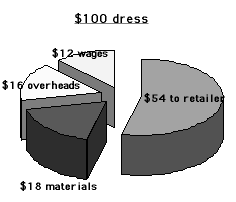About 150 years ago, an intellectual "short-person" emerged named Karl Marx. He looked at the world around him and decided that he did not like it. He molded his worldview into a school of economics. Since that time, free market economists have had to combat with his fallicious theories with facts. Since that time, everyday people have been persuaded by Marx's fallacies because they appeal to the egalitarian views they hold. One of the most hazardous theories that Marx believed was that of surplus value.
For Marx, surplus value is anything that management and supervisors took for themselves from the value of a product. So say a company sells 500 apples for $1 each. The managers and supervisors may take $50, the laborers may take $25, and the other $375 were used to pay for land and capital equipment like water, soil, and other equipment needed to raise the apples. Marx argued that the supervisors and managers took that extra $50 even though they did nothing to contribute to the value of the product. This $50 is the surplus value built into the price of the apples.
This is an image from a Communist website that shows exactly what I described above. In this case, the surplus value is $54. Marx argued that the retailers did not deserve that money because they did not do any work. Marx, as with most of his analysis, falls flat under scrutiny.
First, the critique of surplus value is only valid if we assume that the management and supervisors do not do anything. As we know, this is nonsense. These people organize labor so that it is more productive and efficient. This allows the workers to produce more for their labor. Furthermore, we have to consider that surplus value also goes to investors, and investors provide the capital that furnish a job. After all, without the money that was invested up front for the seeds and the soil and the water, then the employee would not even have a job.
So when people talk about things like a fair wage, they use the surplus value argument as justification. Just remember when discussing this topic with Communists that investors and management are important and provide a valuable service. This is all it takes to dismiss the infantile notion that the management steals from the laborers, nevermind the fact that laborers agree to work for these wages. If they thought that they could make more without the management stealing from the value, then they would be working for themselves.
Related Articles
How Can Goods be Allocated Without a Price System?
Free Trade and Protectionism: Spontaneous Order Always Wins Out
Why Wisconsin is the Future of Labor Unions in the United States



This is exactly what Mao tried to do. He had thousands of worker assigned to make steel at home. Of course it did not work because it take levels of people to make such a product, but you know, it seemed like a good idea.
ReplyDeleteI can't believe people are still trying to defend and promote this man's mush brained theories.
ReplyDeleteTrestin, it's the same problem that faced any Communist economy. Central planning just does not work because you can't know how to allocate resources like that. It has to come from the bottom up, as Mises and Hayek so nicely pointed out.
ReplyDeleteSilverfiddle, the only reason I can come up with is that it appeals to their egalitarian sentiments. Beyond that, the theories are absolutely worthless.
The only thing Marx had going for him was that he knew a good Cuban cigar when he saw one. Unfortunately, his own theories have made it highly unlikely that, were he still around, he'd ever see another. BTW, am adding your excellent site to my blogroll.
ReplyDeleteThe favor is returned. Thank you very much.
ReplyDeleteIt has always amazed me how many people think that management don't do any work. As if the only thing that qualifies as work is physical labor. Working with the mind doesn't count. Those ten and twelve hour days, traveling on Sundays to be at an early morning meeting on Monday, the working lunches and the working dinners and being responsible for making decissions that if wrong will end your career; all of that is worth nothing to the Marxist.
ReplyDeleteThey'll never understand, Jim. The thought of value coming from non-physical things is just too complicated for them. These are probably the same people who think that service jobs provide no value.
ReplyDelete